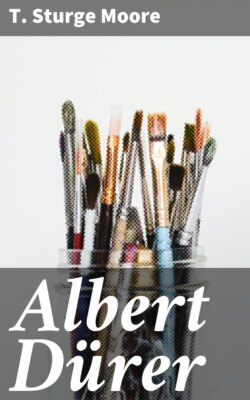Читать книгу Albert Dürer - T. Sturge Moore - Страница 27
На сайте Литреса книга снята с продажи.
XIII
ОглавлениеTable of Contents
I have called docility the necessary midwife of Genius, for so it is; and religion is a discipline that constrains us to learn. The religion of Jesus constrains us to learn the most difficult things, binds us to the most arduous tasks that the mind of man sets itself, as a lover is bound by his affection to accomplish difficult feats for his mistress' sake. Such tasks as Michael Angelo and Dürer set themselves require that the lover's eagerness and zest shall not be exhausted; and to keep them fresh and abundant, in spite of cross circumstances, a discipline of the mind and will is required. This is what they found in the worship of Jesus. The influence of this religious hopefulness and self-discipline on the creative power prevents its being exhausted, perverted, or embittered; and in order that it may effect this perfectly, that influence must be abundant not only within the artist, as it was in Michael Angelo and Dürer, but in the world about them.
This, then, is the value of religious influence to creative art: and though we to-day necessarily regard the personages, localities, and events of the creed as coming under the category of "things that are not," we may still as fervently hope and expect that the things of that category may "bring to nought the things that are," including the superstitious reverence for the creed and its unprovable statements; for has not the victory in human things often been with the things that were not, but which were thus ardently desired and expected? To inquire which of those things are best calculated to advance and nourish creative power, and in what manner, should engage the artist's attention far more than it has of late years. For what he loves, what he hopes, and what he expects would seem, if we study past examples, to exercise as important an influence on a man's creative power as his knowledge of, and respect for, the materials and instruments which he controls do upon his executive capacity.
The universe in which man finds himself may be evil, but not everything it contains is so: then it must for ever remain our only wisdom to labour to transform those parts which we judge to be evil into likeness or conformity to those we judge to be good: and surely he who neglects the forces of hope and adoration in that effort, neglects the better half of his practical strength? The central proposition of Christianity, that this end can only be attained by contemplation and imitation of an example, is, we shall in another place (pp. [305–312]) find, maintained as true in regard to art by Dürer, and by Reynolds, our greatest writer on aesthetics. These great artists, so dissimilar in the outward aspects of their creations, agree in considering that the only way of advancement open to the aspirant is the attempt to form himself on the example of others, by imitating them not slavishly or mechanically, but in the same spirit in which they imitated their forerunners: even as the Christian is bound to seek union with Christ in the same spirit or way in which Jesus had achieved union with his Father--that is, by laying down life to take it again, in meekness and lowliness of heart. Docility is the sovran help to perfection for Dürer and Reynolds, and more or less explicitly for all other great artists who have treated of these questions.
FOOTNOTES:
[11]
Of course all that may have been meant by the phrase "the Evangelist of Art" is that Dürer illustrated the narrative of the Passion; but by this he is not distinguished from many others, and the phrase is suggestive of far more.
[12]
Froude's "Life of Erasmus," Lecture vi.
[13]
Wordsworth's Translation,
[14]
"Literary Remains of Albrecht Dürer," p. 176.
